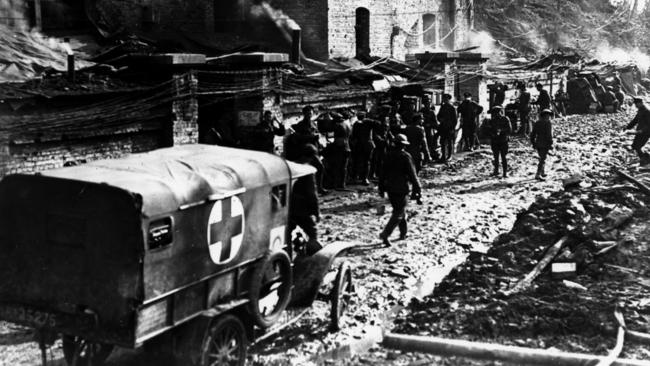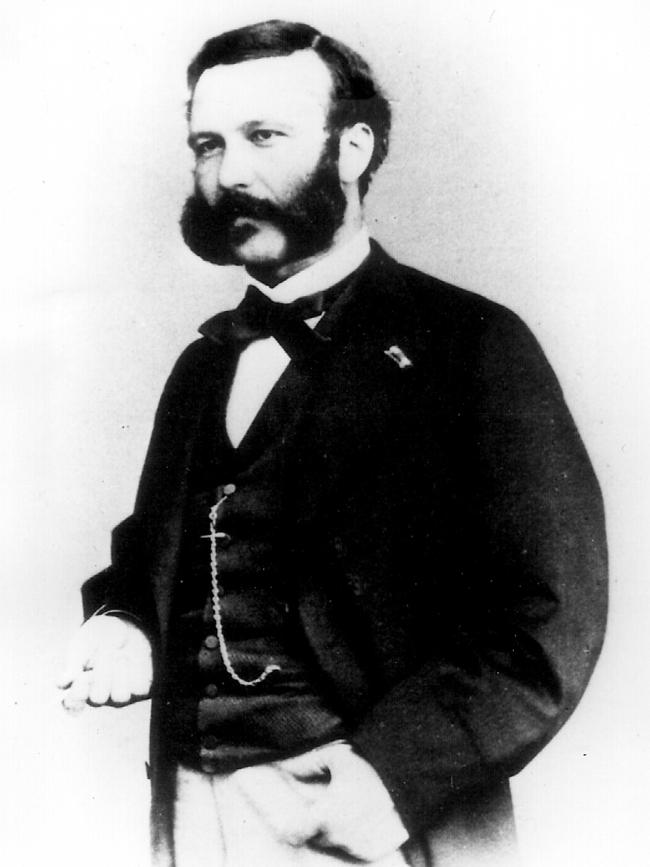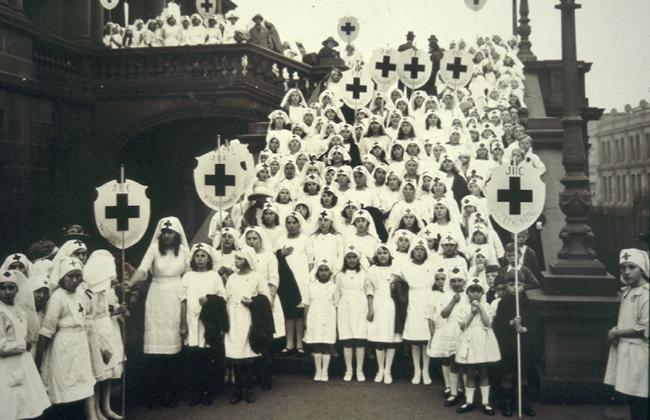Swiss banker Henry Dunant’s dream of aid to fallen warriors led to creation of Red Cross
DESCRIBED as unarmed warriors, the only protection for battlefield medics is their “distinctive sign, a white armlet with a red cross”.

Today in History
Don't miss out on the headlines from Today in History. Followed categories will be added to My News.
DESCRIBED as unarmed warriors, the only protection for thousands of battlefield medics is their uniform “distinctive sign, a white armlet with a red cross”.
Although universally synonymous with care and protection, it is only 155 years since a Swiss committee first mooted the red cross symbol.
And winning support for his idealistic push for a neutral, volunteer medical corps to aid wounded soldiers was a close call for banker and businessman Henry Dunant, born 190 years ago today.
The International Red Cross marks the anniversary of Dunant’s birth, on May 8, 1828, as World Red Cross and Red Crescent Day, commemorating his efforts that in 1864 also initiated the Geneva Convention.
Dunant was the first child of prosperous Geneva businessman Jean-Jacques Dunant and Antoinette Dunant-Colladon. As devout Calvinists, his parents stressed the value of social work. In 1836 his family travelled to Marseilles and Toulon, where Dunant was shocked by inhuman conditions when he visited prisons with his father. In 1847 Dunant co-founded the Thursday Association, a group of young men who met for Bible study and helped the poor. Forced to leave college in 1849 due to poor grades, he took an apprenticeship with bankers Lullin et Sautter. Dunant founded a YMCA Geneva chapter in November 1852, and joined a Paris meeting in 1855 to found YMCA internationally.

Two bank clients in 1853 suggested the business that defined the pinnacle and depths of Dunant’s life, proposing he travel to Setif in eastern Algeria to inspect a concession of 20,000ha from France to establish dozens of villages for Swiss settler-sharefarmers. Dunant wrote two positive accounts after a visit in late 1853, and in 1854 founded his own enterprise, raising funds to build wheat mills to grind wheat to feed the French army, attempts to expand failed and investors received no returns. He raised the equivalent of $1 million to found the Mills of Mons-Djemila company in 1858, travelling to Paris to press for more land. Again unsuccessful, he decided to promote his mill project to Napoleon III, then leading his armies at war with Sardinia against Austria in Italy. Dunant reached Italy on June 24, 1859, as the final campaign battle at Solferino left 6000 dead and 30,000 wounded. The overwhelmed Franco-Sardinian army medical services then had more veterinary surgeons than doctors, while transport was woefully inadequate. French military leaders reported it took six days to bring in 10,212 wounded.
Comrades helped wounded soldiers stagger to nearby villages for food, water and first aid. More than 9000 arrived at Castiglione delle Stiviere, where Dunant was staying. For several days and nights he worked at Chiesa Maggiore church, sheltering more than 500 wounded, bringing water, cleaning wounds and changing dressings. He sent his coachman to buy cloth for dressings, pipes and tobacco, and fruit, and organised local women to tend the injured and dying. Although beset by financial difficulties from his Algerian business, in 1861 he withdrew to study reports on the Italian campaign and compose A Memory of Solferino.

Dunant unflinchingly wrote of nauseating smells, pools of blood, swarms of flies on open wounds, the agonising cries of wounded and dying soldiers. “Why have I told of all these scenes of pain and distress? he asked readers. “Why have I lingered with seeming complacency over lamentable pictures?” He answered with: “Would it not be possible, in time of peace, to form relief societies for the purpose of having care given to the wounded in wartime by zealous, devoted and thoroughly qualified volunteers?”
Dunant sent his book to sovereigns, statesmen, military commanders, doctors, writers and philanthropists and received messages of support from influential supporters across Europe.
Readers included lawyer Gustave Moynier, chairman of the Geneva Public Welfare Society which discussed Dunant’s book on February 9, 1863. Despite scepticism, the Society submitted a paper on Dunant’s ideas to an international welfare congress scheduled in Berlin. One of five members on the International Red Cross drafting committee, Moynier initially disagreed with Dunant’s proposal for neutrality. But under Dunant and Moynier’s leadership, in October 1863, 14 nations set up an organisation to care for soldiers wounded in battle. The Geneva Convention was signed by 12 nations in August 1864.
Dunant’s business collapsed in 1867. He fled Geneva in March and declared bankruptcy. He was also dismissed as International Committee secretary. Dunant became a recluse in the Swiss village of Heiden and was believed dead until discovered by a journalist in 1895. Awarded the inaugural Nobel Peace Prize in 1901, with French pacifist Frederic Passy, Dunant died in 1910.
